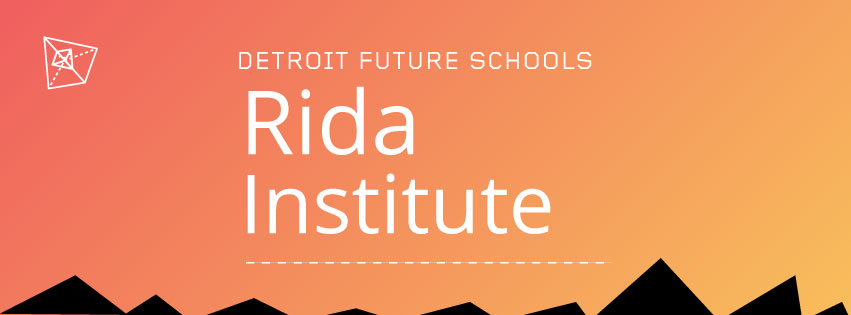 In early August, we convened 20 educators from Metro Detroit to kick off the 2016 Rida Institute at our three-day summer retreat. The Rida Institute is a year-long training for educators with a focus on critical pedagogy. At the summer retreat, we spent three days exploring and experiencing what “humanizing schooling” means to us as Detroit educators, using the “Rida Framework,” DFS’ primary curriculum planning tool.
In early August, we convened 20 educators from Metro Detroit to kick off the 2016 Rida Institute at our three-day summer retreat. The Rida Institute is a year-long training for educators with a focus on critical pedagogy. At the summer retreat, we spent three days exploring and experiencing what “humanizing schooling” means to us as Detroit educators, using the “Rida Framework,” DFS’ primary curriculum planning tool.
While this marked our third Rida Institute, the work of preparing teachers to create humanizing learning environments feels particularly urgent right now, in the context of Detroit’s current realities. We are a city that claims the country’s highest percentage of youth living in poverty and some of the highest rates of violent crime. We are a city with a long and layered history of systemic racism that has resulted in the segregation of our regional school systems and the divestment of resources from many of our neighborhoods. As a result of State legislation that fundamentally restructures our public schools, this is a critical moment for us to explore what a humane and humanizing schooling experience could look like in this city.
Mapping Our Context
We define our “context” as the place and community in which we teach. The Rida Framework asks teachers to reflect deeply about their context and personal motivations and aspirations for why they teach. The framework then supports them to use these reflections to inform every aspect of how they develop curriculum, metrics and facilitation of their classroom.
We started by mapping out the assets and obstacles that our students face when they come to school, then collectively mapped out the larger context of our city, region and country. The maps served as a way for us to start a conversation about systemic issues, such as poverty, racism and violence, and how they affect our classrooms. One of the major ways systemic injustice shows up in individuals is chronic stress and trauma. We discovered that this is not limited to our students; everyone suffers from systems of injustice and inequality and many of us navigate chronic stress and trauma in our own lives. Using this realization as our foundation, we moved on to develop our purpose and principles of education, anchoring our pedagogy in healing trauma through relationship building.
Creating a Healing Learning Experience
What does a classroom that is anchored in healing look like? Many of us, who have chosen education as our life’s work, did so because we experienced a healing learning experience at some point during our time as a student. For some of us, a healing learning experience means we had a teacher who really saw our potential and changed the way we understood a subject. For others it means we went to camp or had an educational experience outside of class that gave us a vision of community and changed who we wanted to be in the world. Whatever the situation, these healing learning experiences were pivotal moments that allowed us to thrive in that moment and shaped who we are as people today.
As we developed our purposes for our classrooms, we examined our own healing learning experiences and worked to understand what made those experiences different from other learning experiences. Not surprisingly, most of us identified a healing learning experience as one in which we engage in deep, caring relationships; feel free to explore, be vulnerable and take on “big challenges”; and develop critical understandings of our lives. It is these elements of a healing learning experience that we hope to cultivate in our classrooms throughout the year.
Defining Success in Our Classrooms
After exploring our context and defining our purpose, we returned to the Rida Framework to develop plans for our classrooms for the upcoming school year. Working in small cohorts, each teacher examined their classroom to understand what was working and what wasn’t, and identified one goal, big or small, that they wanted to focus on for the year. As we move into the school year, teachers will continue to work on their goals and assess their progress through “tune-up” meetings with their cohorts and the larger group. In the fall we will develop a plan for documenting every classroom and in the winter we will come back together as a large group to evaluate and reflect.
Because the teachers are working in different schools, subject areas and communities, what success looks like will be different for each of them. This is one lesson that we miss so often in education: success is not uniform and doesn’t happen overnight. This concept was reiterated in a presentation by Danielle Filipiak, one of the founding teachers of Detroit Future Schools and now a PHD candidate in English Education at Columbia Teachers College. Danielle shared how over the course of her career her purpose and practice of education evolved through an ongoing process of iteration and investigation. Learning about her journey in education really nailed down many of the ideas that emerged throughout the retreat.
Detroit Future Schools is excited to continue working with these teachers throughout the coming school year. You can learn more about DFS’s practices and the “Rida Framework” in the DFS Guide to Humanizing Schooling. Read the guide online or purchase a copy on the AMP Store.




